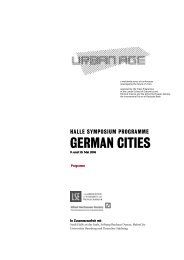India's role in a multi-polar world - Alfred Herrhausen Gesellschaft
India's role in a multi-polar world - Alfred Herrhausen Gesellschaft
India's role in a multi-polar world - Alfred Herrhausen Gesellschaft
Create successful ePaper yourself
Turn your PDF publications into a flip-book with our unique Google optimized e-Paper software.
Introduction<br />
Elena Jurado and Priya Shankar *<br />
“Whatever one says about India, the opposite is<br />
also true”<br />
As the say<strong>in</strong>g goes, India, with its <strong>multi</strong>faceted<br />
diversity, is not easy to categorise. A 21st century global<br />
power or a poor develop<strong>in</strong>g country? An economy<br />
based on cutt<strong>in</strong>g edge technology or subsistence<br />
level agriculture? A liberal secular state or a deeply<br />
religious society? An ancient and traditional civilization<br />
or a culture that is rapidly modernis<strong>in</strong>g? The questions,<br />
paradoxes and possibilities are <strong>in</strong>f<strong>in</strong>ite.<br />
Yet, <strong>in</strong> spite of its <strong>multi</strong>ple realities, it is clear that<br />
India is undergo<strong>in</strong>g a period of remarkable<br />
transformation. Follow<strong>in</strong>g its economic liberalisation<br />
<strong>in</strong> the 1990s, the country has experienced a period of<br />
breathtak<strong>in</strong>g growth, which has also led to profound<br />
socio-cultural change. From the emergence of<br />
sh<strong>in</strong>y new software companies <strong>in</strong> Bangalore to the<br />
appearance of mobile phones <strong>in</strong> the hands of traditional<br />
artisans, this change is clearly visible <strong>in</strong> the evolv<strong>in</strong>g<br />
landscape of the country. Accompany<strong>in</strong>g this period of<br />
<strong>in</strong>ternal transformation, external perceptions of India<br />
have also changed radically over the last decade. It is<br />
now viewed as an emerg<strong>in</strong>g power with <strong>in</strong>creas<strong>in</strong>g<br />
global clout.<br />
On the whole, India’s rise is largely seen as a positive<br />
Through a billion voices: India’s <strong>role</strong> <strong>in</strong> a <strong>multi</strong>-<strong>polar</strong> <strong>world</strong> 7<br />
development. As a plural democracy <strong>in</strong> the develop<strong>in</strong>g<br />
<strong>world</strong>, India has extraord<strong>in</strong>ary symbolic significance. As<br />
a moderate state, it is viewed by many as a stabilis<strong>in</strong>g<br />
force <strong>in</strong> a volatile region. However, at the <strong>in</strong>ternational<br />
level, there is <strong>in</strong>sufficient clarity about India and its<br />
policies. It is sometimes perceived as be<strong>in</strong>g difficult<br />
<strong>in</strong> <strong>in</strong>ternational negotiations, with strong positions<br />
on a whole spectrum of issues from trade to nuclear<br />
non-proliferation. Indeed, many <strong>in</strong> the “west” are<br />
uncerta<strong>in</strong> about what k<strong>in</strong>d of <strong>role</strong> India will play <strong>in</strong> the<br />
<strong>in</strong>ternational system as it acquires greater <strong>in</strong>fluence.<br />
In part, this is because of the complex reality of India.<br />
Simplistic generalisations are not accurate <strong>in</strong> the case<br />
of any country or society, but <strong>in</strong> India, they become<br />
even more problematic. At the same time, there is a<br />
mismatch between the outside <strong>world</strong>’s perception of<br />
India as an emerg<strong>in</strong>g power and India’s own <strong>in</strong>ternal<br />
discourse and reality. While India has long had a sense<br />
of its entitlement <strong>in</strong> <strong>world</strong> affairs, its key concerns are<br />
often <strong>in</strong>ternal, given the enormity of the domestic<br />
challenges it faces.<br />
Our Foresight reader analyses these issues by<br />
compar<strong>in</strong>g the perspectives of Indian and non-Indian<br />
authors on three critical global challenges: susta<strong>in</strong><strong>in</strong>g<br />
economic globalisation; combat<strong>in</strong>g terrorism <strong>in</strong> the<br />
South Asian region; and ensur<strong>in</strong>g resource security.<br />
The section that opens the publication sets the Indian<br />
context, with two essays that explore India’s identity<br />
and <strong>role</strong> <strong>in</strong> a <strong>multi</strong>-<strong>polar</strong> <strong>world</strong>. The volume also<br />
conta<strong>in</strong>s key comparative data that elucidates some of<br />
the recent trends <strong>in</strong> each field. This brief <strong>in</strong>troduction<br />
highlights some of the major arguments put forward.<br />
I: India at the crossroads<br />
The nature of the Indian state as a vibrant and<br />
diverse democracy is essential to understand<strong>in</strong>g its<br />
foreign policy, which can sometimes appear to lack<br />
clear strategic vision. As Sunil Khilnani argues <strong>in</strong> this<br />
volume, the democratic and deliberative nature of<br />
* We are grateful to Michael McTernan, <strong>Alfred</strong>o Cabral, Nick Colwill, Natasha Joshi, Krystian Seibert and Arjun S<strong>in</strong>gh-Muchelle for their excellent<br />
assistance with this publication.<br />
Introduction | Elena Jurado and Priya Shankar








